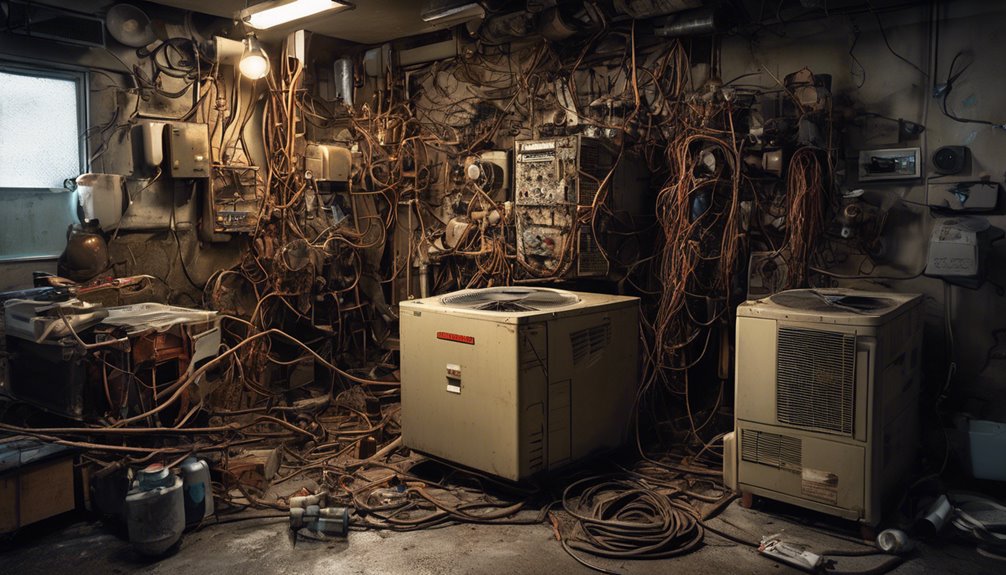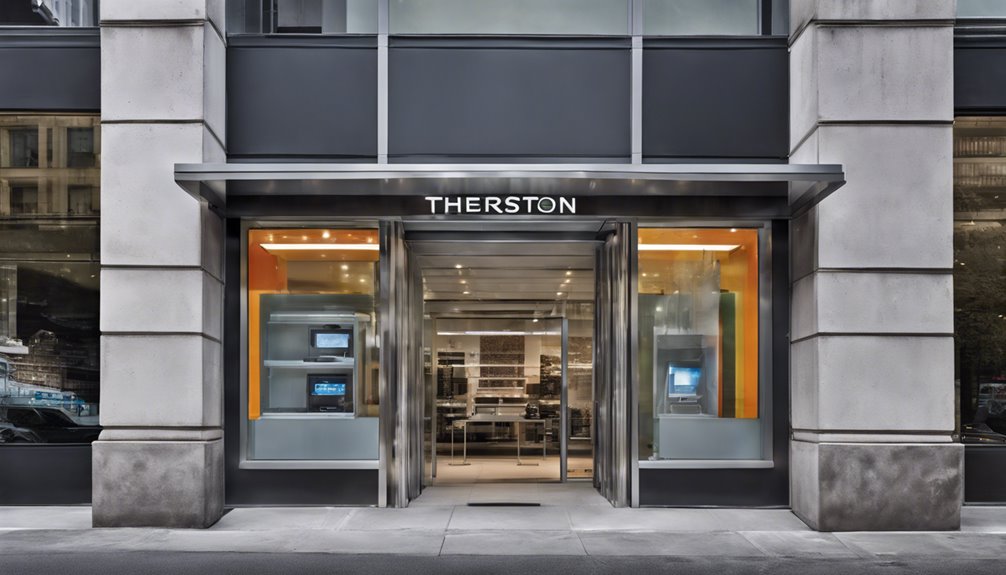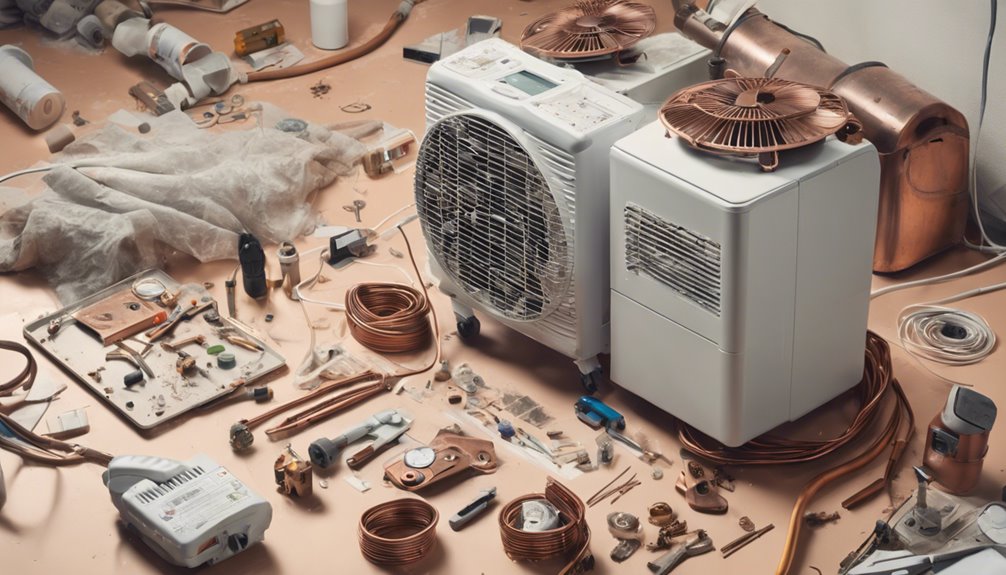When it comes to AC repair, you're probably tempted to put off that call to the expert or try to DIY a fix. But beware – delaying repairs, misdiagnosing the issue, using the wrong replacement parts, and neglecting maintenance can lead to a world of trouble, including increased energy bills, reduced airflow, and even complete system failure. By being aware of these common mistakes, you'll be better equipped to tackle your AC issues head-on and avoid a whole lot of hassle – so take a closer look to ensure you're not making any costly mistakes.
Key Takeaways
- Ignoring AC problems can lead to increased energy bills, reduced airflow, and a decrease in home comfort, making it essential to address issues promptly.
- Delaying professional help can lead to AC neglect, causing further damage, increased repair costs, and even complete system failure.
- Misdiagnosing the issue can result in costly and time-consuming repairs, highlighting the importance of seeking help from a qualified technician.
- Using the wrong replacement parts can lead to further damage, decreased efficiency, and safety hazards, emphasizing the need for authentic and compatible components.
- Neglecting regular maintenance and cleaning can reduce AC performance, increase energy bills, and lead to system breakdowns, making regular upkeep crucial.
Ignoring the Problem Instead of Addressing It
When your air conditioner starts malfunctioning, it's tempting to ignore the issue and hope it resolves itself.
But, putting off AC repairs can lead to more problems down the line. You might think you're saving time and money by delaying repairs, but procrastination habits will only cost you more in the long run.
AC avoidance won't fix the issue, and it can even cause further damage to your unit. Ignoring the problem can also lead to increased energy bills, reduced airflow, and a decrease in your home's overall comfort.
Delaying Professional Help for Too Long
You've tried to troubleshoot the problem on your own, but the issue persists.
Now, you're faced with a tough decision: call a professional or keep trying to fix it yourself. Delaying professional help can lead to AC neglect, which can have serious consequences.
The longer you wait, the more damage your unit may sustain, leading to increased repair costs and even complete system failure. Procrastination consequences can be severe, including higher energy bills, reduced indoor air quality, and a shorter system lifespan.
Don't wait until it's too late – seek help from a qualified technician to diagnose and fix the problem before it spirals out of control.
Misdiagnosing the Issue
When you're trying to fix your AC, it's easy to jump to conclusions and misdiagnose the issue.
Without a thorough understanding of your system, you might overlook simple causes or rely on guesswork, leading to wasted time and money.
Lack of System Knowledge
Without a thorough understanding of your AC system, you're likely to misdiagnose the issue, leading to costly and time-consuming repairs.
You might think you're saving money by attempting DIY fixes, but system complexity often surpasses your DIY limitations. You may replace a faulty part only to find the real problem persists, or worse, create new issues.
This lack of system knowledge can lead to a cycle of trial and error, resulting in wasted time and resources. Don't risk making the problem worse; instead, consult a professional who can accurately diagnose and fix the issue.
Their expertise will save you money and hassle in the long run.
Overlooking Simple Causes
The most straightforward AC issues often get overlooked, leading to misdiagnosis and unnecessary complexity.
You might be surprised how often a simple problem is mistaken for a complex one. Take faulty thermostats, for instance. A thermostat that's not functioning correctly can cause your AC to malfunction, but it's often overlooked in favor of more complex diagnoses.
Similarly, worn belts can cause your AC to vibrate excessively or make strange noises, leading you to think there's a more serious issue at play. But in reality, replacing the belt might be all that's needed.
Relying on Guesswork
You've saved yourself from wasting time and money by checking those simple causes, but now it's time to tackle a more insidious problem: misdiagnosis.
When you're not sure what's wrong with your AC, it's tempting to make hasty decisions and start replacing parts or trying different "solutions" on a whim. Don't fall into this trap!
Trial errors can lead to more problems, not to mention a bigger bill.
Instead, take the time to methodically diagnose the issue. Consult your owner's manual, online resources, or even a professional if needed.
A thorough diagnosis will save you from unnecessary repairs and ensure a more efficient fix.
Using the Wrong Replacement Parts
Faulty air conditioning units often require replacement parts to get them up and running again.
When you're in a pinch, it can be tempting to grab the first available part that seems like it might fit. Don't fall into this trap! Using the wrong replacement parts can lead to further damage, decreased efficiency, and even safety hazards.
Make sure you prioritize parts compatibility and authenticity. Buy from authentic suppliers to ensure you're getting high-quality components designed for your specific AC unit. Don't risk voiding your warranty or causing more problems down the line.
Take the time to research and source the right parts – your AC (and your wallet) will thank you.
Neglecting to Clean and Maintain the Unit
You're probably guilty of neglecting to clean and maintain your AC unit, and that's a costly mistake.
Failing to perform routine maintenance tasks, such as cleaning the air filters and condenser coils, can lead to reduced airflow and increased energy bills.
If you don't stay on top of drainage issues, you're also risking water damage and mold growth.
Dirty Air Filters
Dirty air filters can significantly reduce your AC's performance and efficiency, causing it to work harder and longer to cool your space.
This neglect can lead to dirty consequences, including increased energy bills and a shorter system lifespan. To avoid these issues, make sure to regularly clean and replace your air filters.
- Reduced Filter Functionality: Dirty air filters can't capture dust, dirt, and other debris as effectively, allowing them to circulate in your air and aggravate respiratory issues.
- Increased Energy Consumption: A dirty air filter forces your AC to work harder, consuming more energy and driving up your utility bills.
- System Failure: If you continue to ignore your air filters, your AC may eventually break down, requiring costly repairs or even replacement.
Clogged Condenser Coils
Your air conditioning unit's condenser coils play a crucial role in dissipating heat, but when they become clogged with dirt, dust, and debris, the entire system suffers.
As a homeowner, it's essential to prioritize coil cleaning and maintenance to prevent this issue. Neglecting to clean the coils can lead to reduced airflow, increased energy bills, and even system breakdowns.
Regular coil cleaning can help improve your AC's efficiency and extend its lifespan. Make it a habit to inspect and clean the coils at least once a month, especially during peak summer months.
Ignored Drainage Issues
The condenser unit's drainage system is often an afterthought for many homeowners, leading to neglected maintenance and cleaning.
You mightn't think about it until you're faced with water damage or a drainage blockage.
- Water damage: A clogged condensate drain line can cause water to accumulate around your unit, leading to mold growth, rust, and even electrical issues.
- System failure: A blocked drainage system can put additional pressure on your AC, causing it to malfunction or even break down.
- Increased energy bills: When your AC has to work harder to cool your home due to drainage issues, it can lead to higher energy consumption and bills.
Don't wait until it's too late; make sure to clean and maintain your AC's drainage system regularly to avoid these costly consequences.
Fiddling With Electrical Components Without Expertise
One of the most common mistakes amateur DIY enthusiasts make when attempting to repair their AC unit is meddling with electrical components without proper training or expertise.
You may think you're saving money, but you're actually putting yourself and others at risk. Electrical safety is crucial when working with AC units, and DIY dangers lurk around every corner.
A single misstep can lead to electrical shock, fire, or even death. Without the necessary knowledge and experience, you may also cause further damage to your AC unit, resulting in costly repairs or even complete system failure.
It's not worth the risk – leave electrical component repairs to the professionals.
Frequently Asked Questions
Can I Repair My AC Unit on My Own?
You might be tempted to fix your AC unit yourself, but beware of DIY risks like electrical shock and warranty voidance, which can lead to costly consequences and even render your warranty invalid.
How Often Should I Replace My Air Conditioner's Air Filter?
You should replace your air conditioner's air filter every 1-3 months, depending on filter quality and usage. Regular filter maintenance helps improve airflow, reduces energy bills, and prevents breakdowns, so mark your calendar to stay on track!
What Causes My AC to Freeze up in the Summer?
When you notice your AC freezing up in the summer, it's likely due to dirty evaporator coils or condenser issues. You're probably not cleaning them regularly, causing ice buildup and restricted airflow, which can lead to system failure if not addressed promptly.
Can I Use Any Type of Refrigerant in My AC Unit?
You can't just use any refrigerant in your AC unit; you need to check your unit's specs to ensure compatibility. R-22, R-410A, and R-32 are common refrigerant types, but using the wrong one can cause serious damage or even system failure.
Will Turning My Thermostat Down Really Save Me Money?
You're wondering if cranking down the thermostat will save you cash. The answer is, it depends. Turning it down can improve energy efficiency, but extreme temperature fluctuations can be counterproductive, so find a sweet spot that balances comfort and cost.
Conclusion
You've made it to the end of this article, and now you're better equipped to avoid common AC repair mistakes. Remember, ignoring the problem or delaying professional help can lead to more damage and higher costs. Don't risk your safety or wallet by misdiagnosing the issue or using the wrong parts. Keep your AC unit clean and maintained, and leave electrical components to the experts. By being proactive and informed, you'll stay cool and comfortable all summer long.



